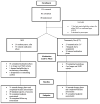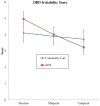A Randomized Clinical Trial of an Integrative Group Therapy for Children With Severe Mood Dysregulation
- PMID: 26903253
- PMCID: PMC4764804
- DOI: 10.1016/j.jaac.2015.12.011
A Randomized Clinical Trial of an Integrative Group Therapy for Children With Severe Mood Dysregulation
Abstract
Objective: Nonepisodic irritability is a common and impairing problem, leading to the development of the diagnoses severe mood dysregulation (SMD) and disruptive mood dysregulation disorder (DMDD). No psychosocial therapies have been formally evaluated for either, with medication being the most common treatment. This study examined the feasibility and efficacy of a joint parent-child intervention for SMD.
Method: A total of 68 participants aged 7 to 12 years with attention-deficit/hyperactivity disorder (ADHD) and SMD were randomly assigned to the 11-week therapy or community-based psychosocial treatment. All participants were first stabilized on psychostimulant medication by study physicians. Of the participants, 56 still manifested impairing SMD symptoms and entered the therapy phase. Masked evaluators assessed participants at baseline, midpoint, and endpoint, with therapy participants reassessed 6 weeks later.
Results: All but 2 therapy participants attended the majority of sessions (n = 29), with families reporting high levels of satisfaction. The primary outcome of change in mood symptoms using the Mood Severity Index (MSI) did not reach significance except in the subset attending the majority of sessions (effect size = 0.53). Therapy was associated with significantly greater improvement in parent-rated irritability (effect size = 0.63). Treatment effects for irritability but not MSI diminished after therapy stopped. Little impact on ADHD symptoms was seen. Results may not be generalizable to youth with SMD and comorbidities different from those seen in this sample of children with ADHD, and are limited by the lack of a gold standard for measuring change in SMD symptoms.
Conclusion: While failing to significantly improve mood symptoms versus community treatment, the integrative therapy was found to be a feasible and efficacious treatment for irritability in participants with SMD and ADHD.
Clinical trial registration information: Group-Based Behavioral Therapy Combined With Stimulant Medication for Treating Children With Attention Deficit Hyperactivity Disorder and Impaired Mood; http://clinicaltrials.gov/; NCT00632619.
Keywords: ADHD; disruptive mood dysregulation disorder; group therapy; psychosocial treatment; severe mood dysregulation.
Copyright © 2016 American Academy of Child and Adolescent Psychiatry. Published by Elsevier Inc. All rights reserved.
Figures


References
Publication types
MeSH terms
Associated data
Grants and funding
LinkOut - more resources
Full Text Sources
Other Literature Sources
Medical

